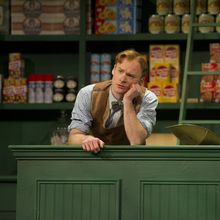Albert Herring - Well Executed, Lacking Depth

Benjamin Britten’s Albert Herring is playing at the Queen Elizabeth Theatre until Dec 8th, a co-production between Pacific Opera Victoria and Vancouver Opera. Albert Herring is advertised as a comic opera dealing with the themes of isolation and alienation. It was certainly more a comedy of errors than the comedic existential struggle I had been anticipating.
In 1947 in England when the opera was first performed, the subject matter was more relevant than it is to today’s Vancouver audience. The structure of Britten’s “chamber opera" was designed to tour in order to be more accessible to the general public. I imagine this aim for accessibility extended to the plot, which is more in line with the drawing-room situational comedies popular to the period. The exciting thing about Albert Herring is how compact the piece is: a cast of thirteen and a twelve piece orchestra, easy and relatively inexpensive to transport. The grace and intelligence of the set design was highlighted during the a vista set changes which are choreographed stories unto themselves.
Although I didn’t connect to the subject matter of the piece, I can still appreciate the technical proficiency of the performers. The physical comedy in particular. I found the energetic hedge clipping of Lady Billows, the fussing of Florence and the rubber legged drunkenness of Albert most endearing, although Superintendent Budd’s caricature was laid on a little thick for my taste. All of the performers did a great job negotiating the complexities of the fast moving, often almost spoken melody. The libretto is amusing and complex, if not quite witty, but it certainly takes up the majority of your attention. The music subtly supports the action without really coming to the foreground.
I did happen to notice some of the clevernesses in the score that were pointed out in the program but, brilliant as they may be, the popular references brought my attention more to the artifice than the action. For the most part the music in Albert Herring subtly guides the audience, supporting the action but always in the background. To be honest the scene changes, all mood and music, were my favourite part of the production.
Comedy opera needs a deep well of feeling to support and juxtapose the triviality and melodrama of the plot. Albert Herring didn’t do it for me, but it was a well-executed production and I truly appreciate the technical proficiency necessary in order to mount such a complex piece.



